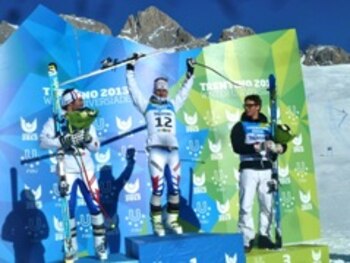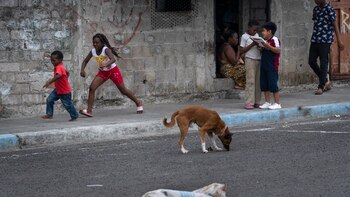
FISU President Gallien Seeks Closer Cooperation with IOC
After five days of competition benefiting from sunny skies and with ideal temperatures for winter sports, the 26th Winter Universiade in Trentino, Italy, enters its final week.
Some 2,800 university student athletes and support staff from 52 countries are attending the multi-sport competition organized by the International University Sports Federation (FISU).
The Universiade, which was first staged in 1959 in Turin, Italy, aims to unite student-athletes from around the world, not just for competition, but also to share experiences, ideals, and culture. "Inspired By You" is the Trentino 2013 motto.
The 11-day competition includes 12 sports contested at 10 venues spread out among five valleys in the mountainous Italian winter sports region. It is the sixth time that Winter Universiade is being staged in Italy, more than any other nation.
FISU president Claude-Louis Gallien told Around the Rings at Sunday evening’s figure skating gala that he is pleased with the results thus far and is highly optimistic for the final week ahead.
"To make a very good Universiade, which has been the case up until now, you need good preparation, competent people, good technique, well-done venues, and a little bit of luck. We have snow, we had sun, and I hope it continues," Gallien said.
Universiade is centered around the University of Trento in the capital of the autonomous Italian region of Trentino, which links central Europe to the Mediterranean.
"In Trentino, we have a beautiful university and, best of all, you have the Alps and the Dolomites, which is unique," Gallien said.
The FISU chief said that with the successful start to the Universiade, also referred to as the Winter World University Games, he is already thinking about Trentino’s legacy.
"Personally, I would love to be able to offer Trentino a great legacy and I think it’s already done because the TV coverage and broadcast has been very good," he said. "I believe, for tourism and making links between the university and young people, it has already happened. I’m satisfied and in some days from now, I will be very happy."
Gallien also advised that he has a "rendezvous" planned with IOC president Thomas Bach in March following the Sochi Olympics, to discuss future cooperation between the two multi-sport organizations.
"I believe that the Universiade, because it’s more flexible being every two years, could be very complimentary to IOC events," Gallien said.
"I hope we can be complimentary in uniting events and that would help to offer more possibilities to the International Sports Federations."
Citing Almaty, Kazakhstan – which will host Winter Universiade 2017 and is also bidding for the 2022 Winter Olympics – as an example, Gallien said that he believes the Universiade could serve as a springboard to winning an Olympic bid.
"Maybe the first time you will not be able to have an Olympics, but if you demonstrate that you are able to have a great event, it will be very good for your Olympic hopes," Gallien said.
"Not only will you have the venues, but the people will have the knowledge and know-how."
Alpine Skiers Enjoy Universiade Experience
Alpine skiing’s speed events took place on the slopes of Passo San Pellegrino in the north of Trentino with French racer Blaise Giezendanner winning the super-G and finishing runner-up in the downhill.
"I wasn’t expecting such a huge event here," said the 21-year-old skier from Chamonix about Universiade. "I’ve been very impressed by the organization and all the people helping at the races. It’s been a very cool experience."
Italian Davide Cazzaniga was the host country’s first gold medalist, speeding to victory in the men’s downhill.
"It was beautiful to win the gold medal," said Cazzaniga, 21, a sociology major. "Universiade is very important to me and very different from other races."
Gianfranco Martin of the Italian National Olympic Committee (CONI) spoke about the merits of Universiade and the bridge that it may offer for athletes to compete in the Olympic Games.
"I think it’s a good chance to improve the level; here we have athletes from other nations that also compete on the Europa Cup," Martin said. "It’s a good way for the athletes – why not a gold medal at Universiade and then a podium at the Olympics in the future."
In women’s competition, Russian national champion Valentina Golokova was fastest in the downhill and finished second in the women’s super-G.
University of Colorado Skiers Represent Team USA
While some athletes competing at Universiade will also take part at the Sochi Olympics or aspire to future Olympics, such as Czech snowboard cross champion Eva Samkova, who is expected to contend for Olympic medals, for others it is more about relishing the overall experience.
The United States alpine and freestyle ski teams are comprised of student athletes from the University of Colorado club program. For ski cross racer Andre Landau, 22, the Universiade will be his last major international competition.
"We all worked hard fund-raising to come here and its been great training and racing here," said Landau, a CU senior in mechanical engineering. "I’ve got two exams tomorrow, which I’ve kind of forgotten aboutbecause it’s been so nice here in Italy."
"For our guys, it’s a once-in-a-lifetime opportunity," said the CU freestyle program director Chris Schoeck. "It’s more about the university and some of our kids having other aspirations besides skiing, like obtaining their degree and moving forward with their lives."
"Five years from now, they’re going to say I represented my university and my country at the World Winter University Games, and that’s a big deal."
Trentino 2013 marks the seventh Universiade for U.S. alpine skiing head coach Richard Rokos, who has also guided the CU program for 22 years, winning six national titles.
"The quality of competition here is underestimated and, after the Olympic Games, this is absolutely next on the scale," Rokos said.
"It’s a fantastic opportunity for student athletes to get experience in a Games-type competition and it’s a blend of athletics, social and cultural."
Rokos, 62, said that over recent years he has witnessed a shift in the alpine skiing nations who place a premium emphasis on Universiade.
"A lot of traditional skiing countries are backing off a bit, but on the other hand, emerging countries from eastern Europe are getting stronger like Hungary, Poland, Russia, and Ukraine, which is making it far more colorful."
Final Week in Trentino
As of Monday afternoon, Russia leads the medals tally with 32, including ten gold. Poland is second with 14 medals and six gold, and host Italy has won eight medals and two gold.
Seventy-eight sets of medals are being awarded, including in snowboard slope style and women’s ski jumping, which will make their Olympic debut in Sochi.
Competition continues all week with the Universiade concluding on Saturday with the men’s ice hockey medals games, snowboard slopestyle, men’s 30km cross-country, and the closing ceremony at the Canazei Ice Stadium.
Written byBrian Pinelliin Trentino
For general comments or questions,click here.20 Years at #1: Your best source of news about the Olympics isAroundTheRings.com, for subscribers only.
Últimas Noticias
Sinner-Alcaraz, the duel that came to succeed the three phenomenons
Table tennis: Brazil’s Bruna Costa Alexandre will be Olympic and Paralympic in Paris 2024

Rugby 7s: the best player of 2023 would only play the medal match in Paris

Rhonex Kipruto, owner of the world record for the 10000 meters on the road, was suspended for six years

Katie Ledecky spoke about doping Chinese swimmers: “It’s difficult to go to Paris knowing that we’re going to compete with some of these athletes”



